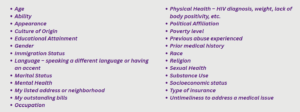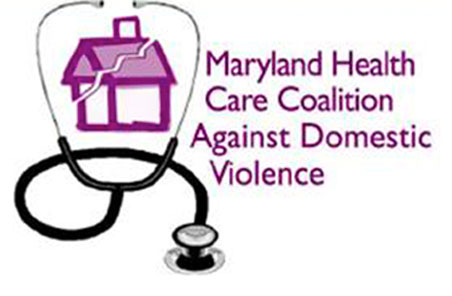Sometimes, individuals, especially trauma survivors, face barriers to receiving quality medical care, and that care can vary depending on who you are and how you navigate the world. This guide aims to help identify these barriers and offer strategies for addressing them.
This webpage was built by survivors for survivors.
Negative experiences in health care can look and feel like:
- My level of pain or experience not being taken seriously
- Certain symptoms being dismissed
- Assuming that I have a higher pain tolerance than someone of a different race or other identifying factor
- Health care professionals refusing to treat or test for certain issues
- Being blamed for the state of my health
- Being accused of being incompliant with or not dedicated to treatment
- Being stereotyped based on any assumed identities
- The health care professional not using or accepting my pronouns
- Feeling singled-out, maybe even segregated or isolated from others
- Avoiding certain hospitals because of past poor treatment
- Being spoken to in a patronizing way or like I am stupid
- Doctors and other health care professionals talking over me
- Having people treat me like I am “crazy” or being dramatic or too concerned
- Health care providers not caring about of being judgmental of my experience of abuse
- A health care provider’s own history of abuse impacting how they treat me or see my experience
- Professionals ignoring my need for an accommodation or being judgmental of my need for an accommodation (accommodations include but are not limited to provision of an interpreter, adaptive equipment, needing to work with a female practitioner or other practitioner who understands my background, using tapping, deep breathing, and other tactics to calm myself, etc.)
Sometimes we can feel like we are receiving differential treatment based on:

We have options!
Strategies for preparing for a medical visit:
- Packing a “go-bag” ahead of time with items I may need at an appointment or emergency hospital visit: snacks, a water bottle, medications that I may need, medical marijuana card, etc.
- Creating a laminated card that outlines prominent medical information (prior surgeries, medications, next of kin)
- Writing down specific health questions ahead of time
- Considering having a card that identifies me as a survivor that I could share with medical staff
- Designating a trusted person to come with me and help me advocate if I need it
- Researching doctors and agencies ahead of time where I might receive better treatment
- Writing down specific health questions ahead of time
Strategies for taking care of myself during a medical visit:
- Making sure to eat and drink enough water
- Taking medications as prescribed
- Asking a trusted person to take notes for me or advocate for me during the visit
- Asking for the accommodations that I need
- Asking for a patient advocate that can be provided by the agency
- Practicing deep breathing tactics, tapping, and/or any other practices that make me feel grounded
Strategies for taking care of myself after a medical visit:
- Creating a plan for how I can take care of myself after my appointment or hospital visit
- Scheduling in extra time after my appointment to decompress
- Making sure I have someone with me following the visit if I need support
- Engaging in yoga, exercise or anything else that makes my body feel good following the visit
We have rights!
- If you notice that the healthcare professional primarily directs their explanations and discussions to about your medical information to your companion, social support person, or other medical providers/ staff rather than directly addressing you, you have the right to ask that the health care professional speak directly to you about your medical information.
- If you request that your medical information be communicated to you directly, the healthcare professional should respect your preference and provide information directly to you, ensuring your privacy and autonomy.
- If you feel like you are not getting the care you need, if the health care professional is rude to you, or if you feel unsafe, you have the right to ask to work with a different health care professional.
- If you express concerns about the quality of care, unprofessional behavior, or feeling unsafe, healthcare facilities should take appropriate measures to address your concerns and accommodate your request for a different healthcare professional whenever possible.
- If you feel unsure about a diagnosis or care plan, you have the right to get a second opinion from another health care professional.
- If you desire a second opinion, you have the right to seek one from another qualified healthcare professional. Healthcare providers should respect your decision and assist you in obtaining the necessary information for a second opinion.
- If you need assistance with language, you have the right to ask for an interpreter to ensure effective communication with your health care provider.
- If you require an interpreter to overcome language barriers, healthcare facilities should provide qualified interpretation services to facilitate effective communication between you and your healthcare provider.
- If you have a disability and require assistive or adaptive equipment, you have the right to ask for the necessary accommodations to meet your needs.
- If you have a disability and need assistive or adaptive equipment, healthcare facilities should make reasonable accommodations to ensure you have access to the equipment necessary to meet your healthcare needs.
Learn more about your rights here with the Patient Bill of Rights (and Maryland Patient’s Bill of Rights Law)
*This document was co-created with the Maryland Health Care Coalition Against Domestic Violence, Physician and Health Disparities Researcher Dr. S. Michelle Ogunwole, and survivors of intimate partner violence.





